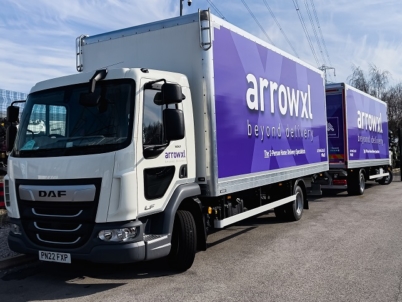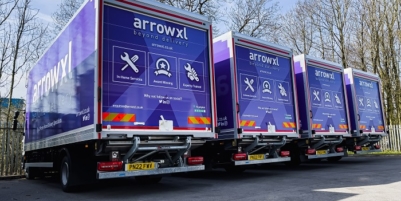-
ROSSLARE EUROPORT TARGETS HEALTH & SAFETY WITH CAMERA TELEMATICS PARTNERSHIP - 2 days ago
-
Landmark Study Reveals Wearable Robotics Significantly Boost Safety and Efficiency in Industrial Environments - July 24, 2024
-
Visku Tackle The Retail Seasonality Challenge One Pallet At A Time - July 22, 2024
-
KAMMAC AND BERGEN LOGISTICS STRENGTHEN FASHION & LIFESTYLE SERVICES IN THE UK - July 19, 2024
-
TENTBOX EXTENDS PARTNERSHIP WITH ARROWXL TO SUPPORT INCREASING DEMAND - July 17, 2024
-
The Perfume Shop improves customer journeys while driving profitability in partnership with Scurri - July 17, 2024
-
ZEROMISSION SECURES £2.3M ($3M) INVESTMENT TO ACCELERATE ELECTRIC FLEETS - July 16, 2024
-
BCMPA CELEBRATES SUCCESS OF 2024 CONFERENCE - July 15, 2024
-
Best of the Best: Jungheinrich Celebrates Triple International Award Win - July 12, 2024
-
GOPLASTICPALLETS.COM CALLS ON NEW CHANCELLOR RACHEL REEVES TO CONSIDER PLASTIC PACKAGING TAX REFORM - July 10, 2024
On the surface, IR35 is just a tweak to current legislation. But in practical terms, it has transformed the working life of many of the UK’s contractors. Including those who work in the UK while living overseas. And, consequently, impacted on the working practices of many businesses.
For many in the logistics sector, the prospect has been too daunting, leading to many drivers rethinking their employment and moving on elsewhere – and leaving logistics enterprises struggling to meet demand for their services. The impact this has already had on the British transport industry is well documented. But what about on the individual level? How is IR35 impacting individual contractors and businesses? And what can you do to navigate the process?
What does IR35 mean for contractors working within the logistics industry?
Prior to IR35, a large percentage of HGV drivers chose to classify themselves as contractors rather than employees. This meant that they lacked many of the benefits of employment, in exchange for a more tax efficient way of working.
With the implementation of IR35, the decision of who can operate as a limited company contractor was handed over to the employer. Along with the ramifications associated with incorrect status determination. This has left many drivers facing a loss of work, or taking the decision to seek employment closer to home, where they don’t need to factor in the additional expenses associated with working overseas that their previous outside-IR35 tax status had allowed them to offset.
What does IR35 mean for logistics businesses?
A contract workforce has always facilitated a simpler business architecture. Admin is minimal – there’s no need for a complex PAYE or HR system when you are simply paying individuals for the hours that they work, with the added bonus of keeping overheads down and flexibility up by working with the contractors you need to suit the current business requirements. With IR35, this has become significantly more complex.
So, what can you do if you wish to remain a contractor or work with contractors in the logistics sector post-IR35?
How can the logistics sector work with IR35?
For businesses, umbrella companies have provided the most sustainable answer to IR35. Acting as an intermediary between contractors and the businesses that wish to work with them, umbrella companies handle all tax and payroll deductions and reporting. Ensuring that all parties work to the letter of the law with full compliance. While enabling contractors to maintain their autonomy, and businesses to access the talent they need without the complication of navigating red tape.
How umbrella companies can benefit contractors
The main reason for contractors to work with a HMRC compliant umbrella company, like Cool Company, is that you can benefit from many of the advantages of employment. Someone else handles your tax and National Insurance. Pensions are available. And you can receive statutory sick pay, holiday pay, and maternity/paternity leave. But you get all this while maintaining your independence. You can choose who you work for and when. If you prefer to provide holiday or sickness cover for a number of different firms, rather than tying yourself to a single company, you can. And you can do it without endless admin.
How umbrella companies can benefit businesses
For businesses, umbrella companies remove the headache of IR35 compliance. They can access all of the contract workers they need without worrying about the paperwork, the time-consuming onboarding, or even the need to fully understand the legislation. It’s exactly the same as working directly with a freelancer used to be, just without the grey areas. And without the potential risk of penalties.
In logistics, as much as anywhere else, the ability to scale is increasingly essential. Having access to a flexible talent pool without the overheads of a large permanent workforce can make the difference between success and failure. Contractors are an essential element of that model, ensuring that you can always scale to meet demand and maximising the potential of your business.
IR35 has, unavoidably, caused disruption across all sectors. Any legislation change always does. But that doesn’t necessarily mean that it’s negative by default. For many freelancers and contractors who have started working through umbrella companies or sourced work through different methods – IR35 has resulted in an increased workload.
Research carried out by Cool Company in September 2021 showed that 78% of contractors said they had secured more work since the introduction of the legislation change – 71% of this number were contractors from the transport and logistics sector – while 64% feel that they are earning more than they were prior to its introduction, including 43% of respondents in transport and logistics.
So, some contractors are finding it easier to secure more work. And businesses are finding it easier to access the skills they need without increasing their permanent payroll. Legislation changes are never popular, but there are ways to plan for them and limit their disruption on your business.
Kris Simpson is the Head of UK B2C for Cool Company and is responsible for operational and compliance in the UK. With over 10 year’s experience in Umbrella Payroll and the Recruitment sector. Kris is Cool Company’s go-to person when it comes to changes in the UK and providing solutions that our customers need.

































